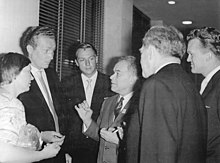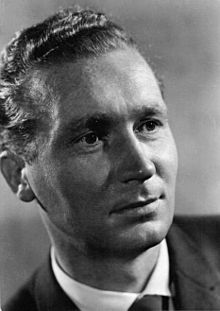Frank Beyer
Frank Beyer (born on May 26, 1932 in Nobitz , Thuringia ; died on October 1, 2006 in Berlin ) was a German film director who made most of his films for DEFA in the GDR , where despite the fact that they have become increasingly critical over the years Attitude towards the SED has received several awards, including the GDR national prize .
To this day, Beyer is regarded as one of the most important, internationally renowned filmmakers in the GDR.
After German reunification , he made a few more films for television in the Federal Republic of Germany in the 1990s, where he was also awarded the Gold Film Band for his life's work (1991) and the Adolf Grimme Prize (1999, for the film Abgehauen ) two of the outstanding national film and television prizes were awarded.
Many of his films deal - often in the form of tragic comedy - from the perspective of protagonists of the "simple average population", to whom he gives an individual identity, critically with the German history of the 20th century or with the effects of "great politics" on the "little man".
The classics among Frank Beyer's cinematographic works are particularly the novel adaptations Nackt unter Wölfen (1963), Spur der Steine (1966) and Jakob the Liar (1974).
Life
Frank Beyer was born the son of a commercial clerk and a saleswoman and grew up with a brother Hermann Beyer . He studied theater studies . In 1951 he became a dramaturge and assistant director at the district theater in Glauchau / Crimmitschau . He studied at the Prague Film School . During his studies he was already assistant director to Kurt Maetzig . In 1957 he went to the DEFA feature film studio as a director . His debut film Two Mothers was released in the same year .


Beyer made several anti-fascist films that deal with events during the Nazi dictatorship and World War II . His film Nackt unter Wölfen (1963) based on the novel of the same name by Bruno Apitz , which deals with the resistance based on historical facts and the solidarity of the prisoners in the Buchenwald concentration camp , became famous . In the same year he shot the comedy Karbid und Sauerampfer , with which Erwin Geschonneck had his breakthrough as a character comedian.
In 1966, his film Spur der Steine - again a film adaptation of the book of the same name by Erik Neutsch published two years earlier - with Manfred Krug in a leading role, caught the eyes of East German censors for the first time . The film, which critically examined everyday life in the GDR, was banned three days after its premiere . Only after the fall of the Wall was Spur der Steine shown again in the cinema. Beyer was banned from making movies for years after the ban. His contract with DEFA was terminated.
After resigning from DEFA, Beyer moved to the Dresden State Theater in 1967 , and in 1969 he went to the German TV Broadcasting Corporation (DFF). In 1974 he returned to DEFA and shot Jakob the Liar . The film adaptation of the novel of the same name by Jurek Becker addresses the budding hopes of the Jews penned in a hopeless situation in the Warsaw ghetto as a result of news about the supposedly advancing Red Army made up by the main character . Jakob the Liar , with the Czech actor Vlastimil Brodský in the title role, is the only GDR film that has ever been nominated for the world-famous film award of the US film industry, the Oscar (1977 in the category: best foreign film ).
Beyer and Becker received the National Prize of the GDR, 2nd class, for art and literature in 1975 . Jacob the Liar was published in 1999 as a Hollywood - remake with Robin Williams in the lead role. When asked about the quality of the remake, Beyer is said to have replied after a screening at the Museum of Modern Art in New York in 1999: "My film is an old film from East Germany, the other film is a new film from Hollywood." My film is an old film from East Germany, the other film is a new film from Hollywood ") On the same occasion, he answered the question to what extent the work as a filmmaker in socialism would differ from that in capitalism :" Former we had censorship, now we have sponsorship. "(translated:" We used to have censorship , today we have sponsorship ")
In 1976 problems arose again between Beyer and the SED because he had signed a petition against Wolf Biermann's expatriation . Beyer was expelled from the SED in 1980. As a result, his options as a director in the GDR were restricted. However, he received a work permit for West Germany.
His 1977 film Das Versteck is a difficult triangular story between a divorced couple and their new friend. The film was not really exploited in the GDR because Manfred Krug played the leading role. Krug had previously applied for an exit visa and had relocated to the Federal Republic after approval.
The 1983 film The Residence, based on the novel of the same name by Hermann Kant , which was to be shown at the Berlinale , caused a sensation . Poland intervened with the festival management because the film showed the story of a young German soldier who was innocently accused of murder in a Polish prisoner of war.
After the fall of the Wall in 1989, Beyer almost exclusively produced films for television. Film adaptations of literature based on templates by Carl Zuckmayer , Erich Loest and Manfred Krug ( Nikolaikirche , Abgehauen ) became known. Between 1996 and 1998 Beyer worked for WDR on the television project Anniversaries , based on the novel series of the same name by Uwe Johnson . However, the production company Eikon officially split up due to "irreconcilable differences" shortly before the shooting of Beyer. The director in turn announced that he had been asked to part with his main actress Julia Jäger and his long-time assistant director Irene Weigel. After failing to meet the demands, Eikon dismissed the artistic staff four weeks before shooting began, while WDR spoke of Beyer's voluntary resignation. Despite a declaration of solidarity for Beyer initiated by Volker Schlöndorff , which was joined by around two dozen well-known artists (including István Szabó , Michael Verhoeven , Marcel Ophüls , Peter Lilienthal , Reinhard Hauff or Manfred Krug ), Margarethe von Trotta was commissioned to direct and Suzanne von Borsody committed to the female lead. For Beyer it was the last work on a film or television production. In 2001 he published his autobiography under the title When the Wind Turns , which he began by describing the failed Anniversaries project.
Beyer was married to the make-up artist Lydia Albrecht from 1956 to 1965 (daughter Elke comes from this relationship), then from 1969 to 1975 with actress Renate Blume (son Alexander comes from the second marriage). In 1985, Beyer was married to TV announcer Monika Unferferth for the third time ; this marriage also ended in divorce. After the reunification he met Karin Kiwus , a (West) German poet. He lived with her until his death on October 1, 2006. His grave is in the Dorotheenstädtischer Friedhof in Berlin in the immediate vicinity of Adolf Dresen and Arnold Zweig .
Awards

- 1961: Heinrich Greif Prize 1st class for five cartridge cases in a collective
- 1962: Karlovy Vary International Film Festival : Medal of recognition for royal children
- 1963: National Prize of the GDR 1st class for naked among wolves in a collective
- 1963: Moscow International Film Festival : Silver Prize (Best Director) for Naked Among Wolves
- 1965: Cineparade Melbourne: Honorary diploma for the nude among wolves
- 1975: National Prize of the GDR 2nd class for Jakob the Liar in the collective
- 1977: Oscar nomination (Best Foreign Film) for Jakob the Liar
- 1979: German Critics' Prize for Das Versteck
- 1984: Critics' Prize of the GDR (Best Film of 1983) for The Stay
- 1984: Heinrich Greif Prize for Staying in a Collective
- 1984: Grand Prize, Director's Prize, Findlings Prize and “Großer Steiger” audience prize at the 3rd GDR National Feature Film Festival for The Residence
- 1990: Berlinale camera at the Berlinale 1990
- 1991: Filmband in gold of the German Film Prize for his life's work
- 1991: Television film award from the German Academy of Performing Arts for the end of innocence
- 1999: Adolf Grimme Prize for the film Abgehauen
- 2002: Golden Ox - Honorary Award of the Mecklenburg-Western Pomerania Film Festival
- 2011: Star on the Boulevard of Stars in Berlin
Filmography
|
|
Fonts
- When the wind turns My films, my life. 2001, ISBN 3-548-60218-5 .
literature
- Ralf Schenk (Ed.): Director: Frank Beyer. Hentrich, Berlin 1995, ISBN 3-89468-156-X .
- Joachim Fischer (Red.): The archive of the director Frank Beyer. Kulturstiftung der Länder, Berlin 2004.
- Hans Günther Pflaum : Frank Beyer retrospective: français. Goethe-Institut Munich, Munich 1996.
- Wolfgang Bittner , Mark vom Hofe: Sponsorship instead of censorship. Frank Beyer . In: I have become a public person. Personalities from film and television . Horlemann Verlag, Bad Honnef 2009, ISBN 978-3-89502-277-7 .
- Short biography for: Beyer, Frank . In: Who was who in the GDR? 5th edition. Volume 1. Ch. Links, Berlin 2010, ISBN 978-3-86153-561-4 .
- Erik Neutsch : Exactly, obsessed with film . In: Mitteldeutsche Zeitung , October 2, 2006 (The writer Neutsch remembers the late director)
- Voices on the death of film director Frank Beyer . In: Die Welt , October 2, 2006
- Regine Sylvester: The stupid one . In: Berliner Zeitung , October 4, 2006, p. 3
- Jens Jessen: The trail of the stones. Craft, increased to great art: On the death of the brilliant East German film director Frank Beyer . In: Die Zeit 41/2006
media
- 1995: Nikolaikirche Leipzig: Frank Beyer filmed Erich Loest's novel. (TV, WDR)
- 1997: Film als Heimat: The director Frank Beyer. (English version: Film as homeland ; TV, Deutsche Welle)
- 1998: There will be a few films left: That was DEFA. (TV, Inter Nationes)
Web links
- Literature by and about Frank Beyer in the catalog of the German National Library
- Frank Beyer at filmportal.de
- Frank Beyer biography at the DEFA Foundation
- Frank Beyer in the Internet Movie Database (English)
- The search for truth between the fronts of the Cold War . WSWS.org, January 31, 2007
Individual evidence
- ↑ Nominations and Awards. Internet Movie Database , accessed May 22, 2015 .
- ↑ a b Claus Löser: Always unbent . In: taz , October 4, 2006, p. 13
- ↑ Frank Beyer . In: Der Spiegel . No. 41 , 2006, p. 230 ( online obituary).
- ↑ Bottom line . In: the daily newspaper , August 31, 1998, p. 17.
- ↑ Absurd accusation . In: Focus , No. 37/1998, pp. 228-229.
- ↑ Diary: Displaced . In: Frankfurter Allgemeine Zeitung , December 9, 1998, p. 42.
- ^ Regine Sylvester: The unreasonable one . In: Berliner Zeitung , October 4, 2006, p. 3.
| personal data | |
|---|---|
| SURNAME | Beyer, Frank |
| ALTERNATIVE NAMES | Beyer, Frank Paul |
| BRIEF DESCRIPTION | German film director |
| DATE OF BIRTH | May 26, 1932 |
| PLACE OF BIRTH | Nobitz near Altenburg, Thuringia |
| DATE OF DEATH | October 1, 2006 |
| Place of death | Berlin |

